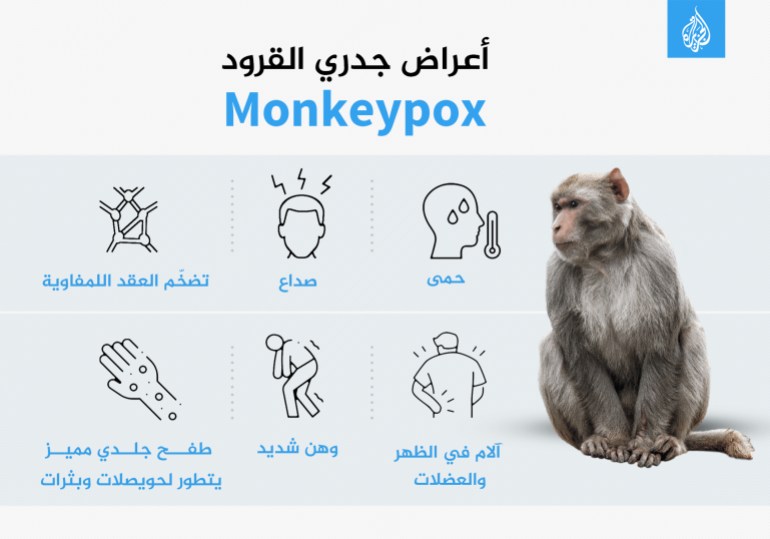By Tuesday, the number of monkeypox cases in the UK had risen to 7, according to the British newspaper The Guardian. What is this disease and what are its symptoms?
What is pox monkeys?
Monkeypox is a rare and zoonotic viral disease (the virus is transmitted from animals to humans) and the symptoms of human infection are similar to those seen in the past by patients with smallpox, but it is less severe.
Although smallpox was eradicated in 1980, monkeypox still occurs sporadically in some parts of Africa, according to the World Health Organization.
Monkeypox virus belongs to the genus Poxvirus of the Poxvirus family.
Monkey pox among humans
Monkeypox was first detected in humans in 1970 in the Democratic Republic of the Congo (known as Zaire at the time) in a 9-year-old boy who lived in an area where smallpox was eradicated in 1968. Most cases have since been reported in rural forested areas The Congo Basin and West Africa, particularly in the seemingly endemic Democratic Republic of the Congo, where a major outbreak of the disease occurred in 1996 and 1997.
In the fall of 2003, confirmed cases of monkeypox were reported in the western central region of the United States of America, indicating that it was the first reported cases of the disease outside the African continent, and it was found that most of the patients infected with it had had contact with domestic prairie dogs.
How is monkeypox transmitted?
Infection results from direct contact with the blood, body fluids, skin lesions or mucous fluids of infected animals.
The World Health Organization says that it has documented cases of infection in Africa caused by handling monkeys, giant gambian rats or squirrels infected with the disease, knowing that rodents are the main reservoir of the virus.
Is monkeypox transmitted through food?
The World Health Organization says it is possible that eating undercooked meat from animals infected with monkeypox may be a risk factor.
Is monkeypox transmitted from one person to another?
Monkeypox does not spread easily between humans and requires close contact.
And according to what the Guardian quoted the US Centers for Disease Control and Prevention as saying, it is believed that transmission from one person to another occurs mainly through large respiratory droplets.
Monkeypox incubation period
The incubation period for monkeypox (the period between infection and symptoms) ranges from 6 to 16 days, but can range from 5 to 21 days.
Symptoms of monkeypox
The stage of infection is divided into two periods:
Invasion period: from the moment of infection to 5 days.
The period of appearance of the rash: within a period of 1 to 3 days after the onset of the fever.
Symptoms of the invasion period of monkeypox
Fever.
excruciating headache
Enlarged lymph nodes.
Back and muscle pain.
They are severe.
Symptoms of the rash period of monkeypox
The rash most often begins on the face and then spreads to other parts of the body.
The rash is most severe on the face (in 95% of cases) and on the palms of the hands and soles of the feet (75%).
The rash develops into vesicles (small fluid-filled blisters) and pustules, which may take up to 3 weeks to disappear completely.
Some patients develop severe enlargement of the lymph nodes before the rash appears, a feature that distinguishes monkeypox from other similar diseases.
Monkeypox symptoms period
Symptoms of monkeypox last from 14 to 21 days, and severe cases of monkeypox are more common in children.
Monkeypox fatality rate
Most patients recover from monkeypox within a few weeks.
However, the World Health Organization says that the death rate in cases varies greatly between epidemics, but does not exceed 10% in documented cases, most of which occur among children.
In general, younger groups appear to be more sensitive to monkeypox.
monkeypox treatment
There are no medicines available for monkeypox.
monkeypox vaccine
There is no vaccine available for monkeypox, but its outbreaks can be controlled.
It has been proven in the past that vaccination against smallpox is 85% effective in preventing monkeypox, but this vaccine is no longer available to the general public after vaccination with it was stopped in the wake of the eradication of smallpox from the world.

